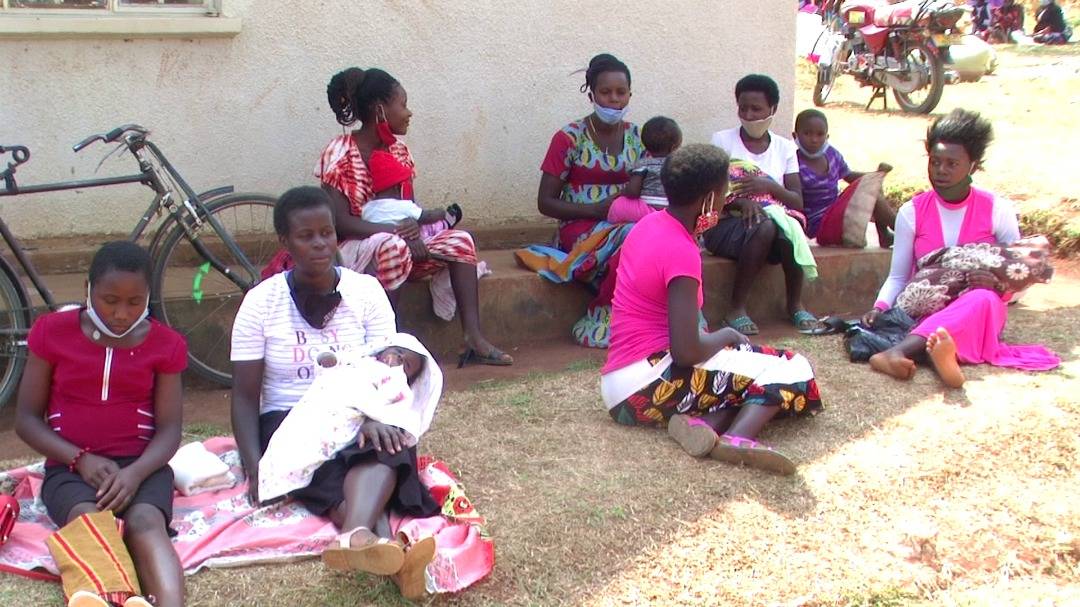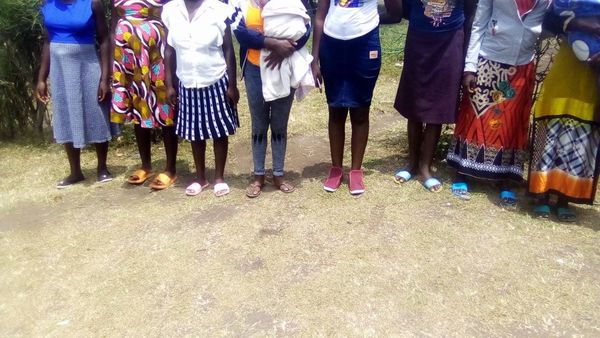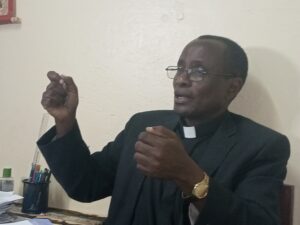
Cultural Practices Hamper Girls Future As Parents Rally Men Break Virginity For Prestige
By Steven Ainganiza Waddell

The bad cultural practices of parents rallying and encouraging men to break the virginity of the school girls for prestige are hampering their future and development of the girls in Ntoroko district of Western Uganda.
29-year old Soul Ayebale of Kyangabukama, Nombe Sub County said, “I was convinced to break the virgins and one time I landed on a 17 year-old girl. After breaking her virginity and impregnating her, I abandoned her”.
However, Ayebale regrets the bad practices that left the young girl suffering because he could not manage looking after her. He is now asking the parents and his fellow youth to refrain from the bad practices that not only ruin the girls’ future but also the boys.
Moses Nyakoojo, 27 of Matali admitted that cases of child marriages and teenage pregnancies are rampant. He said, “Yes, cases of teenage marriages are common here. This is because the parents are greedy for dowry and there is high moral decay. But I warn parents against prioritizing wealth at the expense of their daughters and also they should spare time to talk to children”.
17-year-old girl form Kabimbiri, Haibaale parish, Bweramule Sub County said she was first raped by a man in the neighbourhood when she was in Primary seven. She explained that when she reported the matter to the parents, they forced her into marriage by the parents but to her dismay, after producing the man sent her away.
The victim, who says has no hopes of returning to school says she is languishing in poverty and demands the government give her something to empower her.
16 –year-old of Ntoroko primary school said, “I was defiled in P.5 and later the parents negotiated with the man, paid dowry and forced me to get married him. Now the man beats me daily and I blame my parents for being greedy for dowry which has led to the suffering of many young girls”. “I need help from the government or an NGO to empower me. I can even go back to school if I get the support,” She added.
Eric Sabiiti LCI chairperson Kabimbiri and Muramago Paul LCI Kyangabukama zone Bweramule Sub County, said that parents marry off their daughters as early as 12 years in exchange for cows adding that the Covid 19 lockdown worsened the situation and many girls were married off silently and hundreds got pregnant. They admitted there has been laxity but this time they will embark on arresting men suspected of defilement and parents who connive with the perpetrators.
The Ugandan Penal Code Act defines defilement as “unlawful … sexual intercourse with a girl under the age of eighteen years” and makes the offense punishable by death (para. 129(1)).
According to the Constitution of the Republic of Uganda 1995, as amended to 2018 · 1. A man and a woman are entitled to marry only if they are each of the age of eighteen years and above and are entitled at that age a. to found a family; and b. to equal rights at and in marriage, during marriage and at its dissolution.
Eddy Kabugho the district vice chairperson who doubles as secretary for Health and Education noted that teenage marriages have impacted on the lives of many young girls after losing education and are victims of domestic violence.
Stephen Mutegeki, District Probation and Welfare Officer Ntoroko disclosed that the practices of early marriages and teenage pregnancy are rampant in the district adding that the situation worsened during the covid 19 lockdown.
According to Mutegeki , between January –October 2021, the district registered 944 cases of teenage pregnancies and many went unreported to the police.
He said, “ Karugutu Town Council was leading with 180 cases, Nombe Sub County 137, Kanara 126, Kanara Town Council 96, Butungama 85, Karugutu S/C 71, Bweramule 69, Rwebisengo S/C 67, Rwebisengo Town Council 65 and Kibuuku Town Council 04”.
Mutegeki said, “Majority of these girls got married off according to the information obtained at Health facilities. Disappointingly only 6 cases were recorded to the police and only three perpetrators were apprehended”.
The Probation Officer attributed the problem of early marriage to the cultural practice of the Batuuku tribe marrying off their young girls for dowry and connivance of parents with the perpetrators.
“ We strongly condemn the vice, but we’ve have embarked on massive sensitization of the public on the importance of educating the girl children and the dangers of early marriages to change their cultural perception,” Mutekeki said.
Noah Masereka the Principal District Community Development Officer explained that the issue of early marriages is exacerbated by the culture of the Batuuku who believe that when a man breaks the virginity of the girl becomes prestigious and the auntie is offered cows as an appreciation.
He said, “The Bakonzo culture believes in marrying off their girls at 12-13 years which has left many girls out of school and caused poverty. The parents are ravenous for cows”.
Masereka said the practice has left many girls abandoned, become young mothers and many are victims of poverty and domestic violence.
He however said, “This is a big problem here. But as a district we have hired a lawyer to draft an ordinance that we believe would catch everyone involved in marrying off girls before 18 years hence reduce the vice”.
Ivan Busobozi the Ag. Deputy Chief Administrative Officer acknowledged that early marriage and teenage pregnancy are a big problem and are escalated by the economic activities such as fishing and trade of cattle.
To avert it, Busobozi said the district is evoking the children’s act and the enactment of the ordinance will ensure children’s rights are protected and the perpetrators arrested and prosecuted in courts of law.
Patrick Byaruhanga the District Health Educator Ntoroko condemns and discourages the culture of taking girls for brides which ruins their future system when they are abandoned and chased away by their partners.
He however said, they are continuing to educate the people on the bad cultures, the dangers of teenage pregnancies and encourage the victims to go for antenatal care and deliver from the health facilities to avoid complications and death.
But Joshua Ibanda the District Inspector of Schools revealed that as a department they were overwhelmed by the high numbers of early marriages. He however, said they are working with partners to convince parents to return the girls to school noting that senior women and male teachers have been trained to handle the young mothers in school to avoid stigma and discrimination.
Peter Sunday Rusoke the Gender and Culture minister Tooro Kingdom condemned the act of marrying off the young girls but said the kingdom has embarked on mobilizing clan leaders and Amasaza (county chiefs) to start educating the people on the outlawed cultural practices that affects the girls’ growth and development.
Rt.Rev. Reuben Kisembo Bishop Rwenzori Diocese says as church and society strongly condemned the parents involved in such bad practices of marrying off girls below 18 years breaching the constitution of Uganda.

He said, “I’m disappointed that the girl child is exploited by a parent who would be protecting her not forgetting that an uneducated girl can never make a good stable family and doesn’t enjoy life”.
On apprehending the perpetrators and parents involved in connivance, Bishop Kisembo said Uganda has good policies but the implementation and enforcement is affected by the rampant corruption in local governments, judiciary and police.
Dr. Fr .Pascal Kabura, a Psychologist and Director of Bishop Magambo Counselor Institute, Fort Portal diocese called for concerted efforts to end these cultural practices that kills an individual, hampers emotional growth and will be transitional hence damaging society and the county.

Dr.Kabura said, “Such cultural practices are dangerous and we need to root them out. They deprive the girl of a conducive environment, an opportunity to grow from childhood, adolescents to early adulthood”.
He explained that the girl is physically and emotionally defiled and the result would be “emotional kwashiorkor” isolation, failure to handle life challenges and problems.
Jacky Nafuna the Programmes Manager FAWE Uganda Chapter said in 2020 they carried out a survey in Butungama Sub County and were shocked to find 58 girls below 15 years had been married off in less than a year and no one is bothered.
She said child marriage in Ntoroko district is treated normal and accepted by society because when girls turn 12-15 years fathers demand dowry a factor that fuels the vice making girls highly demanded since a man who marries off a 12 year girl is respected in society compared to marrying a 20 year old woman.
In a bid to end child marriages in Ntoroko, Nafunna revealed that they have started promoting skillful parenting for parents to understand their roles, integrating social economic empowerment to fight poverty as a push factor, sensitization of leaders and parents and push the district to enact the ordinance that will protect the girl child.
The District Police Commander Ntoroko Justus Tashobya said “Children rights include basic needs but to my surprise I see some people here violating them. I strongly condemn that and I think if we collaborate with members of the community, we can put this to an end it,” .
He added: “Few cases of child marriage are reported to our office. The problem is that parents connive with perpetrators and get money from them but now we are trying to bring them on board and we are optimistic if the district passes the ordinance , they will coil as they fear to face the law.”
Alex Basaija Sande, the Senior Probation & Welfare Officer, Ministry of Gender, Labour & Social Development disclosed that in partnership with UNICEF, the ministry has contracted consultants to review the National Strategy to End Early Marriage and Pregnancy 2015-2020 and come up with a new strategy.
An inception report by Dr. Taibu Azah, a consultant (team leader) hired by the Ministry of Gender, Labour and Social indicated that Uganda is home to 5 million child brides. Of these, 1.3 million married before age 15
It also shows that a total of 354,736 teenage pregnancies were registered in 2020, and 196,499 in the first six months of 2021.
25% of the 1.2 million pregnancies recorded in Uganda annually are from teenage mothers (aged 15–19 years), with more than 300,000 pregnancies ending in unsafe abortions.
Only 1 in 5 (21%) of girls aged 15—19 are currently using any modern contraceptive method.
The impact of child marriage on the human rights of women and girls in Uganda. Universal Declaration of Human Rights (1948) Article 16.2: Marriage shall be entered into only with the free and full consent of the intending spouses. Therefore early and forced marriage is a violation of human rights.
Child marriage refers to any formal marriage or informal union between a child under the age of 18 and an adult or another child. While the prevalence of child marriage has decreased worldwide from one in four girls married a decade ago to approximately one in five today the practice remains widespread. Before the COVID-19 pandemic, more than 100 million girls were expected to marry before their eighteenth birthday in the next decade. Now, up to 10 million more girls will be at risk of becoming child brides as a result of the pandemic.
The United Nations Sustainable Development Goals call for global action to end this human rights violation by 2030. Child marriage is often the result of entrenched gender inequality, making girls disproportionately affected by the practice. Globally, the prevalence of child marriage among boys is just one sixth.
Child marriage in Uganda is one of the key VAC abuses with very high prominence among girls and contributes significantly to school dropouts for girls and boys. The UNFPA-UNICEF Uganda Country Profile (2019) reported that 5 million girls in Uganda get married before age 18 and 1.3 million get married before age 15. Child marriage increases the risks of teenage pregnancy and evidence shows that 25% of girls get pregnant before age 18 (UDHS 2016).
According to the Uganda Demographic Health Survey 2016, teenage pregnancy rate in the Rwenzori sub region is over 30%. Teenage pregnancy contributes significantly to school dropouts hence contributing to low completion rates at primary and lower secondary for instance Primary Leaving Examination (PLE) completion rate is 61.5% and completion for lower secondary is 39.6% for males and 36.0% for females (Source: ESSPRR 2016/17). It is also worth noting that child marriage is one of the most under reported VAC cases due to a number of factors that include but not limited to general acceptance of the practice due to underlying norms and practices that make it silent yet it is very common.


